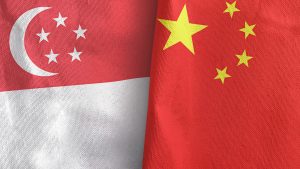Trans-Pacific View author Mercy Kuo regularly engages subject-matter experts, policy practitioners and strategic thinkers across the globe for their diverse insights into U.S. Asia policy. This conversation with Dr. Angelo Venardos – executive director of Philadelphia Pte. Ltd. in Singapore and past board chairman of the Society of Trust and Estate Practitioners (STEP) – is the 359th in “The Trans-Pacific View Insight Series.”
Since the COVID-19 outbreak in 2020, there has been an influx of Chinese capital into Singapore. What is causing this?
While the lack of official statistics make it difficult to confirm actual trends, it has recently been reported by Singapore’s Economic Development Board that an unprecedented surge in global semiconductor demand last year saw Singapore benefit from an inflow of electronics manufacturing projects as the U.S.-China chip war continued and the players sought to reduce risks by diversifying new facilities geographically.
Singapore has always been regarded as the “safe haven” of Asia, and not necessarily the “tax-haven” as so often described by the”West.” When there’s been a crisis in another part of Asia, particularly in Jakarta, Manila, Bangkok, Yangon, or Kuala Lumpur, there is a “flight of capital” to Singapore.
The Singapore model as developed by Lee Kuan Yew offers : a) a stable democratic government, b) a rule of law based jurisdiction, and c) a well-regulated monetary system.
As for the Chinese, be they from China or Hong Kong, the movement of capital commenced prior to COVID-19 as a result of the highly visible and violent democracy protests.
In 2022 Singapore attracted a record S$22.5 billion in fixed asset investment commitments, compared with S$11.8 billion in 2021 and S$17.2 billion in 2020. These investments were expected to create some 17,000 new jobs.
Wealthy Chinese also seem to be relocating their assets and families to Singapore – explain.
For reasons of geopolitical diversification. High Net Worth Individuals (HNWI) from China have found in Singapore all the private banking services akin to those in Switzerland; the private equity and venture capital services from London and New York; and augmented by the presence of all the major global banks represented therein. More recently, the Monetary Authority of Singapore (MAS) has offered attractive tax, residency programs, and other relocation incentives for the setting up of family offices (FO) in Singapore.
To date, in excess of 700 FOs and possibly over 1,000, are believed to have been established in Singapore, with many likely to have come from China. While English is the language of commerce in Singapore, the other three official languages include Mandarin Chinese, Malay, and Tamil, hence enabling the Chinese to find it easy to move both their assets and families to an Asian jurisdiction that also boasts low crime statistics.
Is Singapore eclipsing Hong Kong as a regional financial and banking hub?
Hong Kong was in the past comparable to London and New York for its banking and financial services, such as capital raising IPOs, foreign exchange, and trade finance, thus ranking it as an International Financial Centre (IFC). Today Singapore is now without any doubt the preeminent center for private banking and wealth management.
Hong Kong’s economy was severely battered as a result of the two-year COVID-19 lockdown leading to the obliteration of its tourism industry, while Hong Kong’s once magnificent harbor ground to a near standstill due to China supply chain issues. The IPO capital market lost its shine due to the Beijing-initiated corruption crackdowns and the new policy of wealth flattening in China. Despite these factors, Hong Kong will, based on internal capital flows from China, retain its strong position in terms of servicing the China capital markets, IPOs, and investment banking sectors.
It would be a mistake to consider Hong Kong as down and out, because the entrepreneurial talent of the resilient local Hong Kong people will rebound in due course – if not as an IFC then within China’s Pearl River Delta (PRD) region, to compete with Shanghai and other Chinese cities.
For its part, Singapore, in addition to attracting the global family office sector, the authorities have improved the competitive position of its asset management industry through the introduction of the variable capital company (VCC), a corporate structure applied to collective investment schemes. The VCC structure benefits wealth managers to service family offices with segmented client accounts.
What is the impact of Chinese wealthy elites’ residency on Singaporean society?
With the influx of the wealthy Chinese, Hong Kong Chinese, and expats, real estate property prices and rents have risen significantly in Singapore over the past couple of years. This is putting pressure on the government to introduce relief measures and new property taxing policies to curb the challenge, which has added to inflationary pressures in Singapore.
Recognizing this, the Singapore authorities will respond to deal with inflation as do other Central Banks, by tighter monetary policies and rising interest rates. However, investor concerns are more focused on the geopolitical risks of how Singapore deals with the continuing balancing act of not having to choose sides between the U.S. and China.
Assess how the Singaporean government is managing the challenges and opportunities of this trend.
Singapore has always responded successfully to the opportunities created by such a regional crisis, and as in the past, by preferring to diplomatically play down the issues and not to crow over such opportunities. As such, Singapore is both highly experienced and acutely sensitive to the social and employment challenges brought about by the influx of both capital and people from China into the small island state. That is why Singapore continues to thrive economically.

































